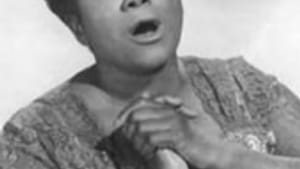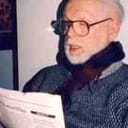Stay in the Loop
BSR publishes on a weekly schedule, with an email newsletter every Wednesday and Thursday morning. There’s no paywall, and subscribing is always free.
Jazz vs. religion? No contest
"DownBeat' magazine at 75

DownBeat magazine was my post-Catholic Bible as I adjusted to secular life after being expelled from Sacred Heart Seminary for secretly smoking after midnight in the Gothic Tower. Glenn Miller's Chesterfield radio broadcasts every evening at 7 p.m. launched my obsessive transition from Gregorian chant.
I had graduated from French horn to trumpet at Holy Rosary, and I used to obsessively play Charlie Spivak's theme song, "Stardream," in the music practice room, because its simplicity encouraged my fantasy of eventually replacing Harry James. Sister John, my grimly serious music teacher, stomped on such fantasies one morning by whomping my knuckles as they sprawled sloppily over the valves. "You look like a jazz musician!" she sneered. If only!
At my new public school, Edwin Denby High, an aspiring jazz drummer named Gil Kamen introduced me to my new Church, the Paradise Theater in midtown Detroit, where "colored" bands played an unending series of weekly stints. We cut class to get the cheap afternoon tickets, sweating out boring "B" movies and idiosyncratic gigs like Pegleg Bates's mix of corny humor and vivid dancing. Summers, it was nearby Eastwood Gardens for the great white dance bands. We were happily bipolar.
Casals praised it
When I took my dead brother's ashes "home" to Detroit from Philadelphia, where he died, I was in a sentimental mood— seeking out the Paradise, sadly to find it closed by an excess of rock music, with a city bicentennial plaque explaining the building's provenance:
After World War I, when Grosse Pointe auto execs were getting their first "Culture" fix, they imported a pianist-conductor from Poland to form a symphony orchestra. Alas, they then forced the musicians to perform in the acoustical equivalent of a junior high cafeteria. The Polish director laid down his demand: Create a decent place, or I'm off to Warsaw. What his patrons delivered was described by no less an ear than Pablo Casals as North America's greatest acoustical space.
But during World War II, Southern blacks abandoned their cotton fields where gins were making them unnecessary and flocked to Detroit's lucrative defense factories. Their crowded housing surrounded the Paradise. When whites fled to the suburbs, they built another symphony hall along the Detroit River. The "Paradise" was born of the abandoned symphony hall.
It lay empty during the rock music boom beginning in the '60s, until an obsessed oboist in the Detroit Symphony raised $23 million dollars to retrieve the old venue. When I gave in to nostalgia to test the "new" hall, I teased that oboist that he had destroyed my youth. He shouted back enthusiastically that the Paradise had a jazz concert every Saturday night— doubly satisfying outcome that a battered city really needed.
A Greenwich Village evening
When I moved to New York on a Ford grant in 1955, I was eager to meet the king of jazz criticism, Marshall Stearns of Hunter College. I figured if Stearns could teach medieval lit and simultaneously be America's leading jazz critic, then my chosen combo of American lit and TV wasn't as schizophrenic as academic skeptics had led me to believe.
One exciting night Stearns invited me to his Greenwich Village pad; Nat Hentoff was the other guest. They were discussing George Wein's idea of launching an annual jazz critic symposium at Newport. (George, having founded the Newport Jazz Festival, was making money; now he wanted to make a difference.)
They invited me to the first Newport Jazz Critics Symposium in 1958, by which time I was a professor at Penn. I drove up from Philly and arrived at the Festival Viking Hotel just as the dining room was closing. I ordered the last chicken. But before I was served, Mahalia Jackson arrived, so I gave her my bird. Dessert— listening to her rambling summary of a singing life— was very tasty indeed.
Mahalia's awkward pause
I'll never forget how that symposium ended. The semanticist Samuel Hayakawa, who was the symposium's chair, saw Jackson at the rear of the auditorium and, believing everyone should be heard, asked, "What do you make of our discussions, Mahalia?"
There was an awkward pause as she composed a response. "I don't knows what youse bin talking about." Shorter pause. "But I shore do love jazz." And I sure had loved spending an hour together, munching that late-night dinner at the Viking.
(I won't forget either my room adjoining Miles Davis's: His all-night physical abuse of his girl friend has haunted me ever since, for my not complaining.)
Terry Gross's chops
My mentor Studs Terkel interviewed Jackson for this DownBeat anthology, and his respect for her desire to keep her churchly singing away from nightclubs is pure Terkel. I'm amazed at the catholicity of this collection. Almost everybody important has his day in the court of jazz criticism, attested to, of course, by the past century's finest jazz critics.
Rarely does a popular magazine dominate a field the way DownBeat did—and still does. It should be a jazz addict's lifetime companion.
The only equally priceless access to great jazz is my wife's discovery two days ago of an Internet service, "Pure Jazz Radio" that broadcasts internationally from New York. The same network plays NPR 24 hours a day. I have just celebrated a turkeyless Thanksgiving with Terry Gross's superb interview of the new Muppets. Her chops are still as fresh air as ever! Even in Weimar, Germany, I'm vicariously back in Philly, electronically. Why? WHYY, that's why.♦
To read a response, click here.
I had graduated from French horn to trumpet at Holy Rosary, and I used to obsessively play Charlie Spivak's theme song, "Stardream," in the music practice room, because its simplicity encouraged my fantasy of eventually replacing Harry James. Sister John, my grimly serious music teacher, stomped on such fantasies one morning by whomping my knuckles as they sprawled sloppily over the valves. "You look like a jazz musician!" she sneered. If only!
At my new public school, Edwin Denby High, an aspiring jazz drummer named Gil Kamen introduced me to my new Church, the Paradise Theater in midtown Detroit, where "colored" bands played an unending series of weekly stints. We cut class to get the cheap afternoon tickets, sweating out boring "B" movies and idiosyncratic gigs like Pegleg Bates's mix of corny humor and vivid dancing. Summers, it was nearby Eastwood Gardens for the great white dance bands. We were happily bipolar.
Casals praised it
When I took my dead brother's ashes "home" to Detroit from Philadelphia, where he died, I was in a sentimental mood— seeking out the Paradise, sadly to find it closed by an excess of rock music, with a city bicentennial plaque explaining the building's provenance:
After World War I, when Grosse Pointe auto execs were getting their first "Culture" fix, they imported a pianist-conductor from Poland to form a symphony orchestra. Alas, they then forced the musicians to perform in the acoustical equivalent of a junior high cafeteria. The Polish director laid down his demand: Create a decent place, or I'm off to Warsaw. What his patrons delivered was described by no less an ear than Pablo Casals as North America's greatest acoustical space.
But during World War II, Southern blacks abandoned their cotton fields where gins were making them unnecessary and flocked to Detroit's lucrative defense factories. Their crowded housing surrounded the Paradise. When whites fled to the suburbs, they built another symphony hall along the Detroit River. The "Paradise" was born of the abandoned symphony hall.
It lay empty during the rock music boom beginning in the '60s, until an obsessed oboist in the Detroit Symphony raised $23 million dollars to retrieve the old venue. When I gave in to nostalgia to test the "new" hall, I teased that oboist that he had destroyed my youth. He shouted back enthusiastically that the Paradise had a jazz concert every Saturday night— doubly satisfying outcome that a battered city really needed.
A Greenwich Village evening
When I moved to New York on a Ford grant in 1955, I was eager to meet the king of jazz criticism, Marshall Stearns of Hunter College. I figured if Stearns could teach medieval lit and simultaneously be America's leading jazz critic, then my chosen combo of American lit and TV wasn't as schizophrenic as academic skeptics had led me to believe.
One exciting night Stearns invited me to his Greenwich Village pad; Nat Hentoff was the other guest. They were discussing George Wein's idea of launching an annual jazz critic symposium at Newport. (George, having founded the Newport Jazz Festival, was making money; now he wanted to make a difference.)
They invited me to the first Newport Jazz Critics Symposium in 1958, by which time I was a professor at Penn. I drove up from Philly and arrived at the Festival Viking Hotel just as the dining room was closing. I ordered the last chicken. But before I was served, Mahalia Jackson arrived, so I gave her my bird. Dessert— listening to her rambling summary of a singing life— was very tasty indeed.
Mahalia's awkward pause
I'll never forget how that symposium ended. The semanticist Samuel Hayakawa, who was the symposium's chair, saw Jackson at the rear of the auditorium and, believing everyone should be heard, asked, "What do you make of our discussions, Mahalia?"
There was an awkward pause as she composed a response. "I don't knows what youse bin talking about." Shorter pause. "But I shore do love jazz." And I sure had loved spending an hour together, munching that late-night dinner at the Viking.
(I won't forget either my room adjoining Miles Davis's: His all-night physical abuse of his girl friend has haunted me ever since, for my not complaining.)
Terry Gross's chops
My mentor Studs Terkel interviewed Jackson for this DownBeat anthology, and his respect for her desire to keep her churchly singing away from nightclubs is pure Terkel. I'm amazed at the catholicity of this collection. Almost everybody important has his day in the court of jazz criticism, attested to, of course, by the past century's finest jazz critics.
Rarely does a popular magazine dominate a field the way DownBeat did—and still does. It should be a jazz addict's lifetime companion.
The only equally priceless access to great jazz is my wife's discovery two days ago of an Internet service, "Pure Jazz Radio" that broadcasts internationally from New York. The same network plays NPR 24 hours a day. I have just celebrated a turkeyless Thanksgiving with Terry Gross's superb interview of the new Muppets. Her chops are still as fresh air as ever! Even in Weimar, Germany, I'm vicariously back in Philly, electronically. Why? WHYY, that's why.♦
To read a response, click here.
What, When, Where
The Great Jazz Interviews: A 75th Anniversary Anthology. Frank Alkyer, Editor. Hal Leonard Books, 2009. 352 pages; $27.99. www.amazon.com.
Sign up for our newsletter
All of the week's new articles, all in one place. Sign up for the free weekly BSR newsletters, and don't miss a conversation.

 Patrick D. Hazard
Patrick D. Hazard